Last updated: February 26, 2025
Article
Intrusted to a Letter
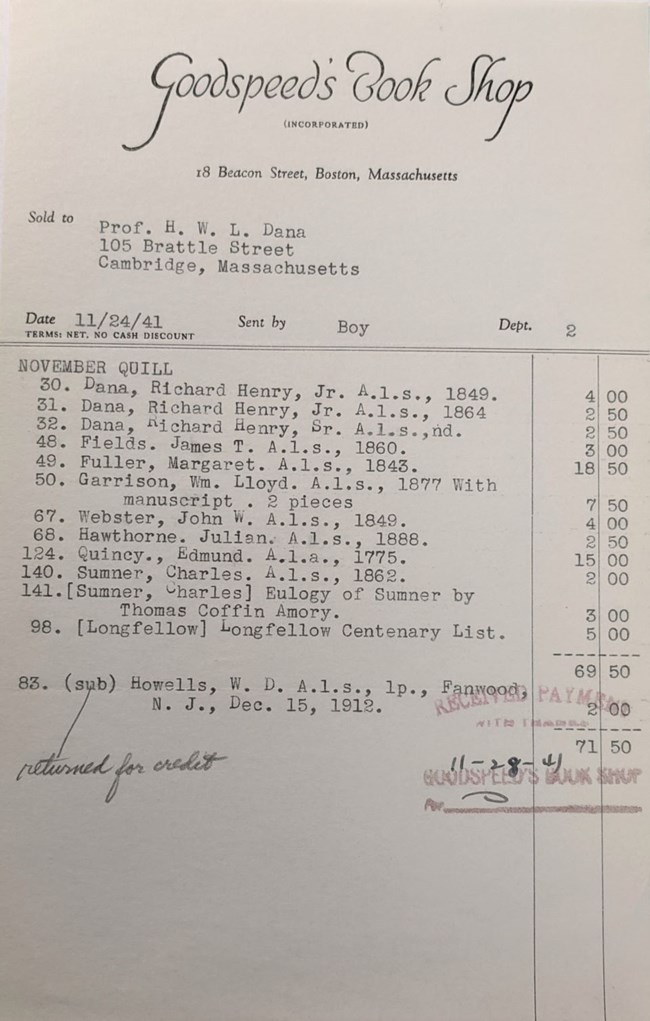
H.W.L. Dana Papers, Longfellow House-Washington's Headquarters NHS
Harry Dana, grandson of famed poet Henry Wadsworth Longfellow, served as an important caretaker of the Longfellow House, preserving his grandfather’s Cambridge estate. As a part of his impressive collection efforts, Dana procured a unique assortment of letters from the American Revolution. Today, these letters are contained in a group of collected material titled "Miscellaneous Famous People" in the Henry Wadsworth Longfellow Dana Papers.
Dana focused his research and collecting efforts on Longfellow’s literary network and Cambridge’s colonial and revolutionary history. He purchased letters related to the Revolution throughout the 1930s and 1940s, purchasing from dealers including Goodspeeds Book Shop in Boston and Forrest G. Sweet in Michigan. Dana collected some of these letters for their content: intelligence reports, descriptions of the early conflicts of the war and their aftermath, and documents from Washington’s time in his Cambridge headquarters. Some letters, however, were collected primarily for their association with the heroes of the Revolution – General George Washington, General Nathanael Greene, and the Marquis de Lafayette.
Though they are a small sampling of revolutionary letters, this group provides insight into what information and sentiments people chose to “intrust to a Letter.” If intercepted, information on troop strength and movements could be militarily disastrous, and treasonous opinions on Great Britain and its court could condemn the author. Together, they shed light on the early days of the Revolution in New England.
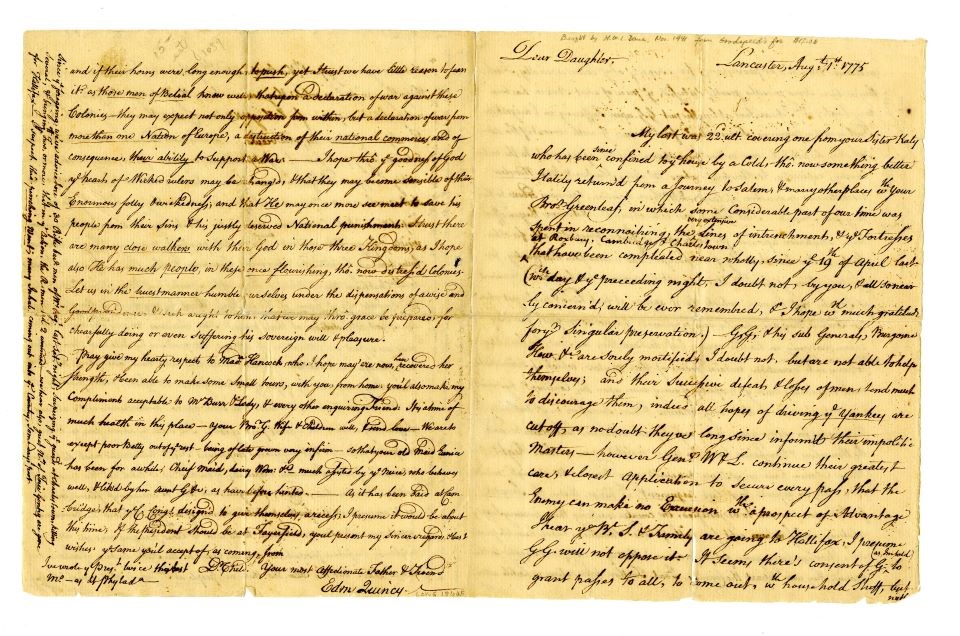
H.W.L. Dana Papers, Longfellow House-Washington's Headquarters NHS
Edmund Quincy to Dorothy Quincy, August 1775
It’s said, by advice from G. B. [Great Britain] since our packet return’d, ye Concord important Fight, had created much disturbance ye arrival of later Skirmishes, & especially, of an Audt. of ye fatal loss the Enemy met with at Bunker-hill, so Call’d, I imagine, will tend to encrease ye flame...
Writing from Lancaster, outside the besieged city of Boston, Edmund Quincy mixes news of family and the surrounding war. Quincy’s letter apprises his daughter of the happenings of the war, describing expanding intrenchments surrounding British troops in Boston and increasing shortages of “fuel as well as provisions.” More than three months after the Battle of Lexington and Concord, word had recently reached the colonies of the “disturbance” created in England by news of the battle, with Quincy noting that news of heavy losses at the Battle of Bunker Hill was still in transit. He asserts that the King and his advisors – “those men of Belial” – should know that a declaration of war against the colonies will spur great opposition from European powers as well as destroy Britain’s national commerce. Quincy’s tone displays contempt for his British counterparts and a tremendous confidence in the American cause.
In addition to family news of illnesses and recoveries, Quincy reports, “I hear ye Br. S. [Brother Sewall] & Family are going to Hallifax.” As in many families, there were divided loyalties within the Quincy family; Dorothy’s sister Esther and her husband Jonathan Sewall – former royal attorney general of Massachusetts and owner of a Brattle Street mansion – chose to leave Massachusetts and permanently relocate to Nova Scotia. In contrast, Quincy describes surveying intrenchments alongside his son-in-law William Greenleaf, and closes by asking Dorothy to give his “sincere regard, & best wishes” to her fiance, President of Congress John Hancock.
Lancaster, Augt 1st: 1775
Dear Daughter,
My last was 22d ult. covering one from your Sister Katy who has been ^since^ confined to ye house by a Cold, tho now something better. I lately return’d from a Journey to Salem, & many other places, wth your Bror Greenleaf, in which some Considerable part of our time was spent in reconnoitring the ^very extensive^ Lines of intrenchments, & ye Fortresses ^at Roxbury, Cambridge & Charlestown^ that have been compleated near wholly, since ye 19th of April last (wch day & ye proceeding night, I doubt not, by you, & all so nearly concern’d, will be ever remembred, & I hope wth much gratitude for yr singular preservation.) — G.G. & his sub Generals, Burgoine How &c are sorely mortified, I doubt not, but are not able to help themselves; and their Successive defeats & losses of men, send much to discourage them, indeed all hopes of driving ye Yankees are cut off, as no doubt they’ve long since inform’d their impolitic masters — however Gens. W & L continue their greatest care, & closest Application to secure every pass, that the Enemy can make no Excursion wth a prospect of Advantage I hear ye Br. S. & Family are going to Hallifax, I presume GG. will not oppose it. It seems there’s consent of G. ^(as Im told)^ to grant passes to all, to come out, wth household Staff, but with without Merchz & or provisions, for a supply of ye latter, especially, [Fresh], they’ve been some months greatly [distressed], ye price of what stole in has been very high; wch I hear, has at length put G.G. upon Suffering an Emigration Fuel as well as provisions, Scarce & dearX, for wch reason, G. with consent of the Admiral has dipatch’d, one or two men of war & a no. of transports to the eastern country, especially, to Penobscot, where Mr Secry Flucker & Isaac Winslow are extensive proprietors of lands — & pr their direction, & previous orders to their very few Friends — Fuel & ^live^ stock was to be obtain’d — & it seems theyve offer’d there a pistereen a pound for beef, upon ye foot — & proportionally for other Stocks, as Ive been told by ye Messenger, who is come from that Country, for assistance from ye Govr: — is seems abt 2 or 300 men had been rais’d to prevent ye supply of ye Enemy: which tho it appears at first hard & cruel, yet when the Errand they are upon is due considered, it is not so in fact, for they appear, not only in hostile array, but declare they are Sent, by hostilities ^upon our non Submission^ to Carry into execution certain orders of their Masters, which if Submitted to must inevitably ruin ye property of every man upon this Continent, by subjecting it to the will of those very Masters & their Successors in ye authority wch they have for some years, in so unjustifiable a manner laid claim to, and by themselves & Emissaries have on paper insisted upon as their Right, & these Colonies have in ye same peaceable way denied — till at length on both sides, they’ve appeal’d to ye last argument. wth Kings, that is; the Sword for wch reason, we are to be justified, in counterworking them in every Supply whatever, unless it askt for, with ye Sword Sheathed, & upon humble proposal, (hostages being given for performance) that upon a sufficient supply for their money, they will depart the Country, wthout Further depredations or hostile action, wt whatever, against any part of this Continent: wch if their orders would permit, is the best thing they can do. as while they remain here, they’l distress the Country, create a vast publick expense, for both ye old & new Country, & will every month ^further^ distance the object of their despotic views - - - - - as it is now evident, that the whole united Colonies, (by ye permission of a Just providence) encrease faster, every month, in their ability to support a defensive war, than our Enemies can, in theirs to support so such a cruel, as well as ^an^ unnatural offensive war, as they’ve, been by the most impolitic wicked Counsellors drawn into: Each days continuance therein very visible plunges Administration ^deeper^ in publick perplexity & misery — They’ve been wofully deceived, by interested & designing Governors & other Crown Officers, & even [pedlars] (as Ld. Chatham tells of ministry, in one of his speeches in ye House of Lords)* all which tho sensible of, ye honor of the Nation! Wont by any means suffer them to own by a silent retraction of their present silly measures, or any otherwise; neither may we expect an Alteration of Affairs, till produced by [interline intestine?] Broils at home or a Foreign war, the latter of which would long since have taken place, had it not been solely prevented, by disgraceful Submissions, concessions, & other practices of a B. Administration; & which will soon appear to the World, as it is already Sufficiently evident to a great part of it — It’s said, by advice from G. B. since our packet return’d, that ye Concord important Fight, had created much disturbance ye arrival of later Skirmishes, & especially, of an Audt. of ye fatal loss the Enemy met with at Bunker-hill , so Call’d, I imagine, will tend to encrease ye flame, even so as to consume all the further projected Schemes of a weak Administ.on — however I expect our next advices, will tend to disperse ye Cloud ^of doubt^ hanging over us: either by brightening our future prospects, or drawing round us the Sable curtain of declared national War: but this latter, tho there are people at St. James’s mad enough to threaten & and if their hours were long enough to push, yet I trust we have little reason to fear it: as those men of Belial know well, that upon a declaration of war against these Colonies — they may expect not only opposition from within, but a declaration of war from more than one Nation of Europe, a destruction of their national commerce and of consequence, their ability to Support a War: — I hope thro ye goodness of God ye hearts of Wicked rulers may be chang’d, & that they may become sensible of their Enormous folly & wickedness; and that He may once more see meet to save his people from their sins & his justly deserved National punishments: I trust there are many close walkers with their God in those three Kingdoms, as I hope also He has much people, in these once flourishing, tho now distress’d Colonies. Let us in the truest manner humble ourselves under the dispensations of a wise and Good providence, & seek aright to have, that we may thro. grace be prepared, for chearfully doing or even suffering his sovereign will & pleasure.
Pray give my hearty respects to Madm. Hancock , who I hope may ’ere now, ^have^ recovered her Strength, & been able to make some small tours, with you, from home: you’l also make my Compliments acceptable to Mr. Burr & Lady, & every other enquiring Friend: Its a time of much health in this place — your Bro. G. Wife & Children well, & send love — We are to except-poor Betty out of ye rest— being of late grown very infirm — so that your old maid [Eunice] has been for awhile, Cheif maid, dairy Wom: &c- much assisted by yo neice, who behaves well, & lik’d by her aunt G &c, as have before hinted — As it has been said at Cambridge, that ye Congs. design’d to give themselves a recess; I presume it would be about this time; If the president should be at Fayerfield, youl present my sincere regard, & best wishes: ye same you’l accept of, as coming, from
Your most Affectionate Father & Friend, Edm Quincy
[Page Two, top left margin:] x even poor veal ¼ cup of good 2/ a calf’s head - a dollar - sheeps - ½
[Page Three, left margin:] * one of the most fatal articles of their deception has been, that their dear Friends & Favorites have ever assured them, contrary to the truth of Facts, that the Americans, tho. stout eno, to brag on paper, would never shew themselves agt Regulary: but might always be expected to keep themselves at a safe distance: upon wch G. Lee in a late paper has whip’d one [Col Grant], upon his pledging himself in ye H. of Commons & on ye cowardice of ye Americans, from just own personal [illegible] it into be had not appear’d lately [illegible]
[Page Four, left margin:] Since ye foregoing, we’ve advice here of 30 Rifle bard men of W.’s [regt] last Saty night, Surprising ye guards at Charlestown, killing Several, & bringing ^off^ Two, or more, that in ye [cusion], the R. men and 2 wounded — we hear also, great No. of Torie Gentry are gone for Hallifax — I suspect thro pinching Want; many Inhab. coming out into ye Country, some days past
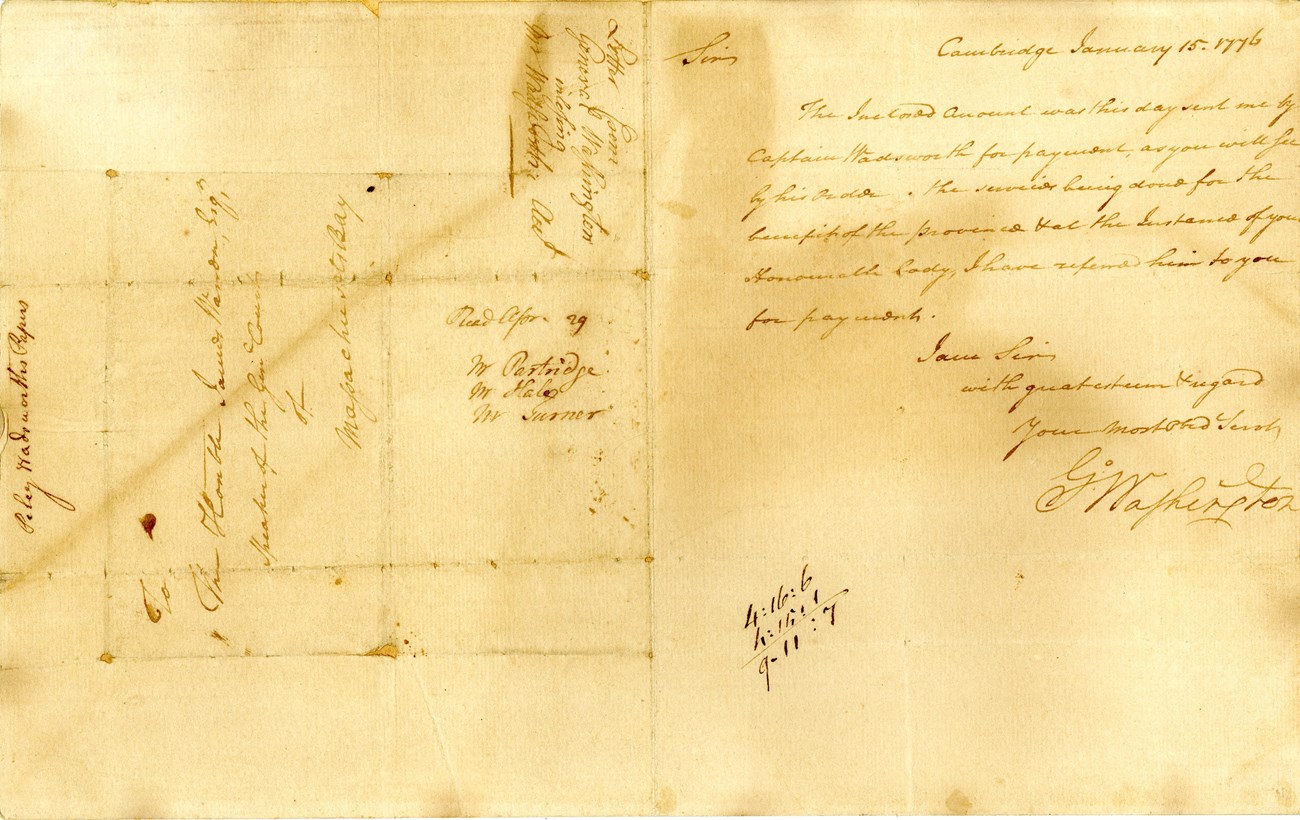
H.W.L. Dana Papers, Longfellow House-Washington's Headquarters NHS
General George Washington to James Warren, January 1776
...the services being done for the benefit of the province & at the Instance of your Honourable body, I have referrd him to you for payment.
Writing from his Cambridge headquarters, in this letter General Washington forwards a request for payment for military actions to the Speaker for the General Court of Massachusetts. Though couched in diplomatic language, there is clearly an underlying disagreement about which body holds the responsibility for payment – the Continental Army or the Massachusetts government. In October 1776, the Massachusetts Genearl Court passed a resolve authorizing payment of the “Account of Peleg Wadsworth, for flinging up some Works & to examine Cape Cod Harbor, for the Defence of the Town of Plymouth, by Genl Ward’s, & Washington Order Horse hire, expences, Board &c. amounting to £9.11.7.” Notably, while the state eventually agreed to pay, each party claimed the work was done at the other’s order.
While the letter is short and logistical, it holds a clear familial value for Dana and the collection. The man requesting payment was Captain Peleg Wadsworth, the grandfather of Dana’s grandfather Henry Wadsworth Longfellow.
Cambridge January 15. 1776
Sir
The Inclosed amount was this day sent me by Captain Wadsworth for payment, as you will see by his order. the services being done for the benefit of the province & at the Instance of your Honourable body, I have referrd him to you for payment.
I am Sir
with great esteem & regard
Your most obed Servt
Go. Washington
4:16:6
4:15:1
9.11:7
To
The Honble James Warren, Esqr.
Speaker of the Gen Court
Of
Massachusetts Bay
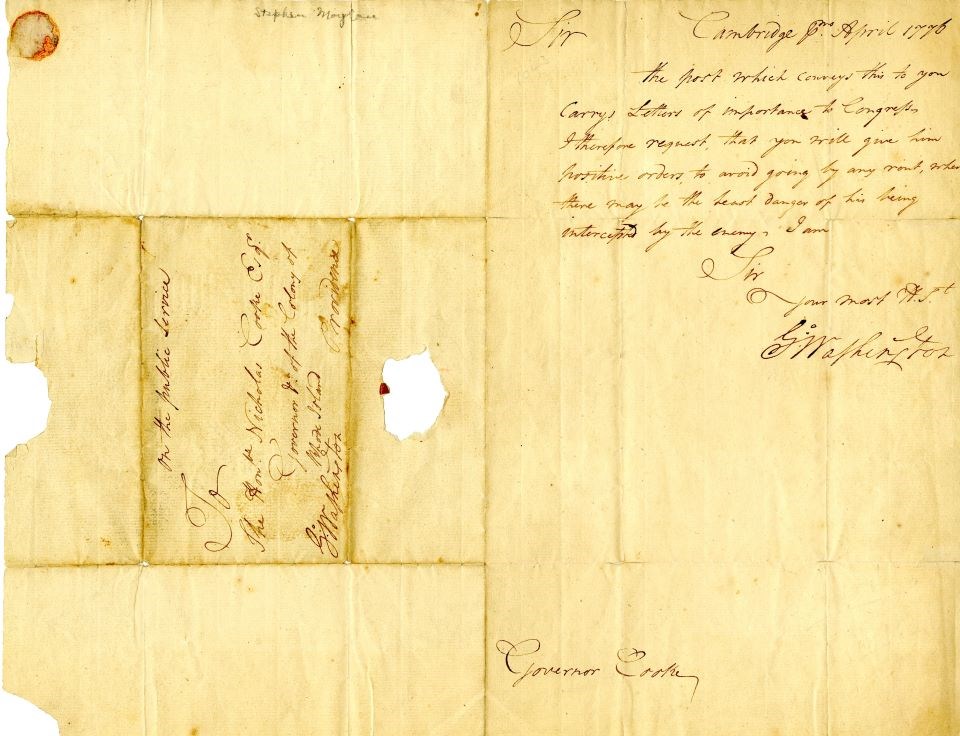
H.W.L. Dana Papers, Longfellow House-Washington's Headquarters National Historic Site
General George Washington to Governor Nicholas Cooke, April 1776
the post which conveys this to you Carrys Letters of importance to Congress, I therefore request, that you will give him positive orders, to avoid going by any rout, where there may be the least danger of his being intercepted by the enemy
This short letter, written in the first days of April 1776, was one of Washington’s last letters written from his Cambridge Headquarters. The penciled note on the upper edge suggests that the body was written by Stephen Moylan, one of the general’s aides-de-camp.
This message, to Governor Nicholas Cooke of Rhode Island, asks for assistance for the courier carrying “Letters of importance to Congress” in Philadelphia. The George Washington Papers at the Library of Congress contain two messages to Congress in early April 1776. The first, dated April 1, informs Congress of Cooke’s report of an imminent attack on Newport. The second, dated April 4, reports on army enlistments and payments, and relays that the Newport intelligence was a false alarm. Each of these letters enclosed a copy of the letters sent from Cooke in Providence to Washington in Cambridge by Express.
Cambridge Hqrs April 1776
Sir
the post which conveys this to you Carrys Letters of importance to Congress, I therefore request, that you will give him positive orders, to avoid going by any rout, where there may be the least danger of his being intercepted by the enemy, I am
Sir
Your most ob. S.t
Go. Washington
Governor Cooke
On the Public service To The Hon.ble Nicholas Cooke Esqr. Governor &a of the Colony of Rhode Island Providence Go. Washington
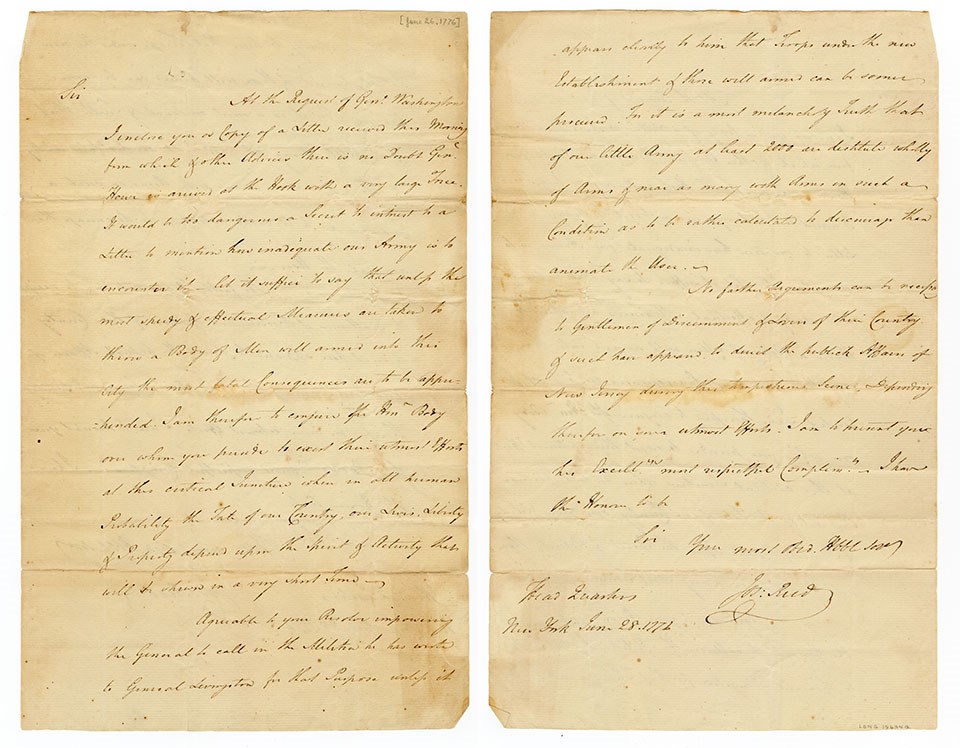
H.W.L. Dana Papers, Longfellow House - Washington's Headquarters National Historic Site
Colonel Joseph Reed to Samuel Tucker, June 1776
Genl. Howe is arrived at the Hook with a very large Force. It would be too dangerous a Secret to intrust to a Letter to mention how inadequate our Army is to encounter it.
Colonel Joseph Reed served as Washington’s military secretary in the opening chapter of the American Revolution, spending July to October 1775 as part of the general’s military family in Cambridge.
Shortly after rejoining the army as adjutant general in June 1776, Reed wrote to the President of New Jersey’s Provincial Congress “At the Request of Genl. Washington.” In the letter, Reed explains the dire state of the Continental Army and asks for the “utmost Efforts” of New Jersey’s legislature and militia. His uncertainty foreshadows the American failure at the Battle of Long Island and subsequent British occupation of New York. Reed’s accounts of British General William Howe’s troops and the Continental Army’s inability to successfully counter his forces displays the critical condition of Washington’s fledgling force.
Ironically, Reed’s choice to entrust to a letter his doubts about Washington’s leadership during this period led to his falling out with the general at the end of 1776.
[pencil annotation, HWLD hand:] [June 26, 1776]
Sir
At the Request of Genl. Washington, I inclose you a Copy of a Letter received this morning from which & other Advices there is no doubt Genl. Howe is arrived at the Hook with a very large Force. It would be too dangerous a Secret to intrust to a Letter to mention how inadequate our Army is to encounter it - let it suffice to say that unless the most speedy & effectual Measures are taken to throw a Body of Men well armed into this City the most fatal Consequences are to be apprehended. I am therefore to enjoin the Hon. Body over whom you preside to exert their utmost Efforts at the critical Junction when in all human Probability the Fate of our Country, our Lives, Liberty, and Property depend upon the Spirit & Activity that will be shown in a very short Time.
Agreeable to your Resolve impowering the General to call in the Militia he has wrote to General Livingston for that Purpose unless it appears deadly to him that Troops under the new Establishment & those well armed can be sooner procured. For it is a most melancholy Truth that of our little Army at least 2000 are destitute wholly of Arms & near as many with Arms in such a Condition as to be rather calculated to [demean] than animate the masses.
No farther Arguments can be necessa[ry] to Gentlemen of Discernment & Lovers of their Country & such have appeared to direcet the publick Affairs of New Jersey during this tempestuous Scene. Depending therefor on your utmost Efforts. I am to present you his Excellys most respectful Complimts. I have the Honor to be
Sir Your most obed. Hbble svt,
Jos. Reed
Head Quarters
New York June 28. 1776
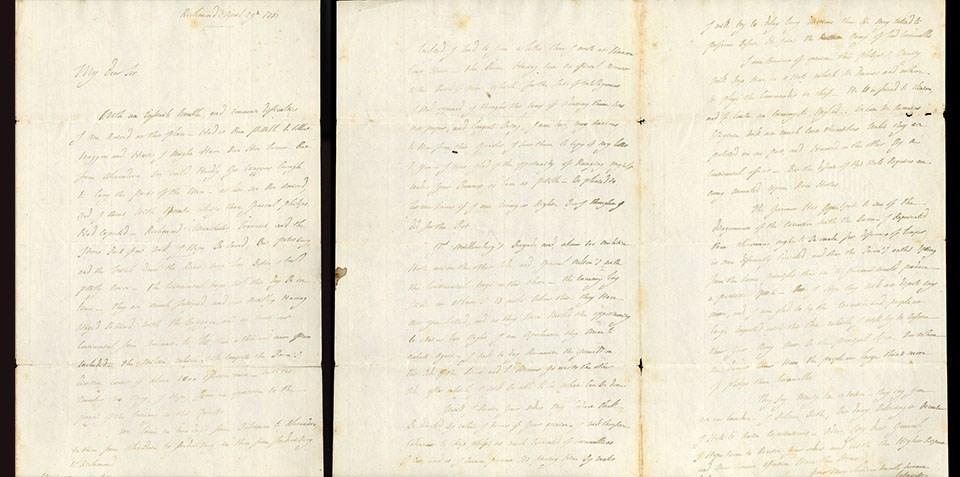
H.W.L. Dana Papers, Longfellow House-Washington's Headquarters National Historic Site
Marquis de Lafayette to Major General Nathanael Greene, April 1781
The Continental troops will this day be in town. They are much fatigued, and our artillery having stayed behind with baggage and an escort, our Continental force amounts to less than a thousand men, officers included. The militia, which will compose the Baron’s division consists of about 1800 effective men. With this number, we may, I hope, form an opposition to the progress of the Enemy in this Quarter.
In this letter, Lafayette reports his arrival – with “infinite trouble, and innumerable difficulties” – at Richmond, Virginia to assist in the southern campaign under General Nathanael Greene's leadership. The young Frenchman gives a comprehensive account of the situation in Virginia, predicting the actions of British Major General William Phillips, assessing the Virginia militia, and commenting on the rocky relationship between Prussian soldier Baron von Steuben and Virginia Governor Thomas Jefferson.
His closing alludes to the circulation of news and rumors during the Revolution: “They say ninety six is taken. They say you are at Camden. I believe both, but deny believing it because I hate to raise expectations.” Greene’s troops in South Carolina had in fact suffered a defeat at the Battle of Hobkirks Hill outside Camden and had not yet begun their unsuccessful siege of Ninety Six.
Richmond April 29th 1781
My dear sir,
With an infinite trouble, and innumerable difficulties I am arrived at this place. Had it been possible to collect waggons and horses I might have been here sooner. But from Alexandria I could hardly get waggons enough to carry the packs of the men. at last we are arrived, and, I think, with greater unity than General Philips had expected. Richmond, Manchester, Warwick, and the stores back of us will, I hope, be saved, but Petersburg and the vessels down the river were lost before I could possibly arrive. The Continental troops will this day be in town. They are much fatigued, and our artillery having stayed behind with baggage and an escort, our Continental force amounts to less than a thousand men, officers included. The militia, which will compose the Baron’s division consists of about 1800 effective men. With this number, we may, I hope, form an opposition to the progress of the Enemy in this Quarter.
We came in two days from Baltimore to Alexandria, in three from Alexandria to Fredericksburg, in three from Fredericksburg to Richmond.
Inclosed I send to you a letter that I wrote at Hanover Court House. The Baron having sent an official account to the Board of war which for the sake of intelligences I had opened, I thought this way of adressing them was not proper, and Congress being, I am sure, very anxious to hear from this quarter, I send them a copy of my letter to you. I was glad of the opportunity of ranging myself under your banners as soon as possible. Be pleased to let me know if I am wrong or right. But I thought I did for the best.
Gnl Mühlenberg’s brigade and about 100 militia horse are on the other side, and General Nelson’s with the Continental troops on this shore. The enemy lay still as [illegible] 13 miles below this. They have not yet crossed, and as they have missed the opportunity to attack us last night, I am apprehensive they mean to embark again. I will to day recconnoitre the grounds on this side of the river and to morrow go over to the other side after which I will be able to see what can be done.
Untill I receive your order my conduct shall be directed by what I know of your opinion. I will therefore endeavor to keep Philips as much separated of Cornwallis as I can, and as I cannot prevent his joining him by water I will try to delay long [Motions] that he may intend to perform before he joins the army of Lord Cornwallis.
I am however of opinion that Philip’s vanity will keep him in a state which he knows and where he plays the commander in chief. He is a friend to Clinton, and of course an [enemy] to [Mylord]. In case he remains Virginia will not much exert themselves unless they are protected on one part, and hurried on the other by a Continental officer. But the defense of this state requires an army mounted upon race horses.
The Governor has again spoke to me of the disagreements of the executive with the Baron. I represented that allowances ought to be made for differences of temper in men differently educated, and that the Baron’s oaths spring from the same principles that in a governor would produce a patriotic speech. But I hope they will not dispute any more, and I am glad to see the executive and people at large impressed with this idea which I will try to [enforce] that your army should be the principal object. But when the danger comes home, the people at large think more of Philips than Cornwallis.
They say ninety six is taken. They say you are at Camden. I believe both, but deny believing it because I hate to raise expectations. Adieu, my dear general, I hope soon to receive your orders and with the highest respect and most sincere affection have the honor.
Your most obedient humble servant,
Lafayette
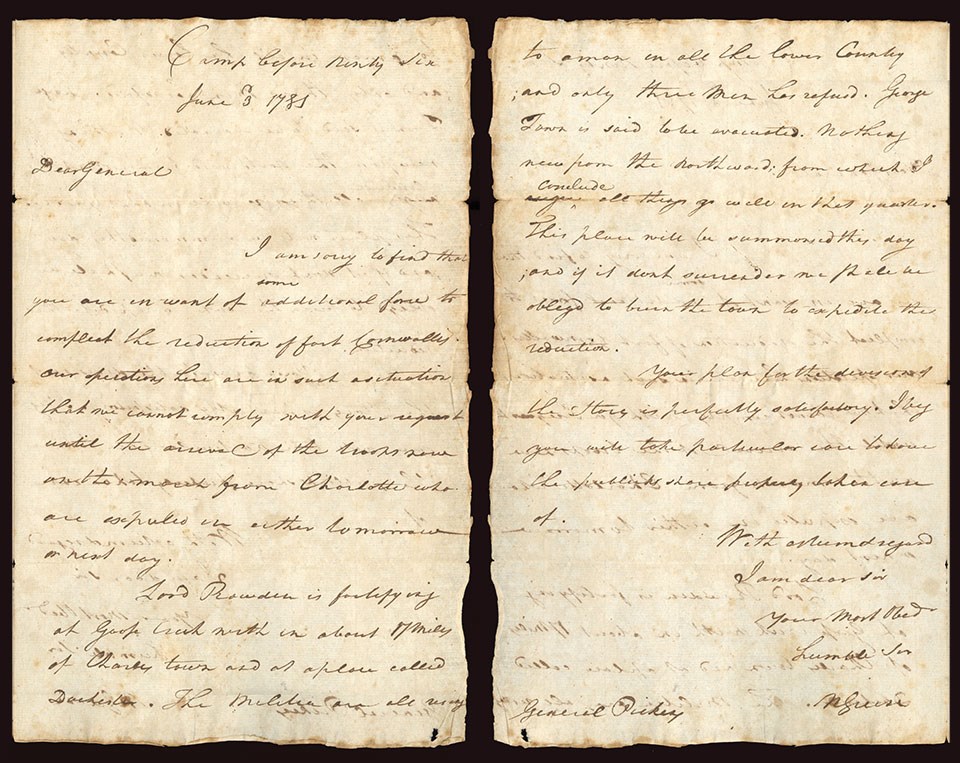
H.W.L. Dana Papers, Longfellow House-Washington's Headquarters National Historic Site
Major General Nathanael Greene to General Andrew Pickens, June 1781
The militia are all rising to a man in all the lower Country; and only three men have refused. ... This place will be summoned this day; and if it dont surrender we shall be obliged to burn the town to expedite the reduction.
Both Nathanael Greene and Andrew Pickens were commanding troops laying siege to fortifications, Greene at Ninety Six, South Carolina, and Pickens at Augusta, Georgia. Greene dated this letter from “Camp before ninety six” where his army would unsuccessfully launch an assault on June 18. Despite Greene’s inability to send “additional force to compleat [sic] the reduction of fort Cornwallis,” the loyalists defending the fort surrendered to Continental troops on June 5.
Greene’s letter offers an important glimpse at the state of affairs in the south late in the Revolution. Greene remarks on the status of Lord Rawdon, British commander defending Georgia and South Carolina, and the support for the Continental Army from the low country militia. The letter captures the general’s positive sentiment, as he informs Pickens of patriot successes in nearby cities just months before the decisive Siege of Yorktown.
Camp before ninety six
June 3d 1781
Dear General,
I am sorry to find that you are in want of some additional force to compleat [sic] the reduction of fort Cornwallis. Our operations here are in such a situation that we cannot comply with your request until the arrival of the troops now on the march from Charlotte who are expected in either tomorrow or next day.
Lord Rawdon is fortifying at Goose Creek with in about 17 miles of Charles town and at a place called Dorchester. The militia are all rising to a man in all the lower Country; and only three men have refused. George Town is said to be evacuated. Nothing new from the northward; from which I [??] ^conclude all things go well in that quarter. This place will be summoned this day; and if it dont surrender we shall be obliged to burn the town to expedite the reduction.
Your plan for the division of the Stores is perfectly satisfactory. I beg you will take particular care to have the publick’s share properly taken care of.
With affectionate regard
I am dear sir
Your Most Obed
humble Ser
N Greene
Sources
American Battlefield Trust. https://www.battlefields.org/learn/revolutionary-war
J.L. Bell. George Washington's Cambridge Headquarters and Home: Historic Resource Study. (Cambridge, MA: National Park Service, February 2012).
John Henry Clifford, The Acts and Resolves, Public and Private, of the Province of the Massachusetts Bay, Resolves, 1775-76, chap. 419 (Boston: Wright & Potter, 1918), 609. https://archive.org/details/actsresolvespass7576mass/page/608/mode/2up
George Washington, George Washington Papers, Series 3, Varick Transcripts, 1775 to 1785, Subseries 3A, Continental Congress, 1775 to 1783, Letterbook 1:- Sept. 22, 1776. 1775. Manuscript/Mixed Material. https://www.loc.gov/item/mgw3a.001/.
George Washington, George Washington Papers, Series 2, Letterbooks 1754 to 1799: Letterbook 8, March 14. 1776. Manuscript/Mixed Material. https://www.loc.gov/item/mgw2.008/.
George Washington's Mount Vernon. The Digitial Encyclopedia of George Washington. https://www.mountvernon.org/library/digitalhistory/digital-encyclopedia/
